- Home
- Robert Muchamore
Secret Army Page 16
Secret Army Read online
Page 16
‘This is as close as we can get to a real-world test of your skills without dropping you behind enemy lines. Nobody apart from the people in this room and a few senior members of the police force knows what you’re doing. You’ll need to enter a secure facility. If you’re spotted, the chances are you’ll be shot at by armed guards if you don’t surrender quickly. You are allowed to tie up or temporarily disable people. You may not do anything that is likely to cause permanent injuries.
‘You’ll find additional maps, drawings and photographs in the mission briefings which will be handed out as you leave this room. I strongly suggest that you use your time onboard the aircraft to study these documents. Each of you will also be given a sealed envelope containing a surrender letter. This letter explains your actions and requests that a message be sent to SOE headquarters in Baker Street.
‘If you surrender or get captured, hand over this letter of explanation and we will do our best to rescue you as soon as possible. However, don’t rely on anyone believing that you’re who you say you are and if you’re captured there’s a good chance you’ll be roughed up by people who think they’ve caught a spy.
‘To pass the exercise, each team must deliver the weapon to the lost property desk at King’s Cross station by midnight tomorrow. That gives you forty-five hours from the time of your parachute drop. The mission is a team effort. The whole team will pass, even if only one member makes it to the station with the weapon. And that is all I’m going to say, except to bid you good luck.’
CHAPTER TWENTY-SIX
The Wellington droned, a thousand metres above the industrial heart of England. This was the closest any of the trainees had come to a real parachute operation, instead of a ten-minute flight and a drop on to fields, with instructors and trucks awaiting them.
The five kids had been in the air for three hours. They’d seen war rage through the bomber’s rear dome: flames from an air raid, pockets of flak and vapour trails from dog fights in the moonlit sky. The Kids, Birds, Poles and Frogs huddled in four separate packs, bums perched on parachutes and fearing the worst as the condensation in their breath turned to ice on the inside of the fuselage.
Everyone looked for clues in the briefing documents, but there wasn’t much to go on. Each team had a map showing an area of ten miles square and listing three target sites. Their landing zone would be somewhere within this area, but the map gave no indication as to where. There were also photographs of the target buildings and diagrams showing the appearance of a twenty-millimetre anti-aircraft cannon, along with instructions on disassembly.
‘I wonder what the other teams have got on their maps,’ Rosie yelled, though it barely registered over the aircraft noise and only Marc and PT who sat on either side of her heard.
‘If our maps are worse than theirs, you mean?’ Marc said. ‘Less detailed, or harder targets, maybe.’
‘Walker messed up all our equipment,’ Joel noted. ‘So it’s safe to assume that he’s messed with our information too.’
Marc smiled. ‘Walker hates Henderson so much our surrender letters probably tell our captors to shoot us as enemy spies.’
Rosie took a deep breath and opened her mouth into a wide yawn. The bomber was unpressurised and air was thin at this altitude. The previous day had been tough and they were back in action after less than four hours’ sleep.
Sadness hung in the air as the Frogs and Birds lined up to make their jumps. There was a slight chance the groups would meet during the exercise, but they were competing against the clock not each other and they’d most likely never see each other again.
As the last of the Norwegian women stepped over Rosie’s legs to hook up, a hairclip dropped into Rosie’s lap. Rosie reached up to pat the woman on the back and return it, but as she turned it in her hand she saw a tube made from a cigarette paper wedged between the teeth.
Rosie checked that none of the staff was looking her way before unravelling the paper. It was a tiny hand-drawn map, with the ink showing through both sides of the paper. She made an immediate connection between the three marks on the map and the targets she’d been given with her kit. But off to one side was a fourth place, marked DZ for drop zone. At the bottom was a note in tiny handwriting.
Rosie,
Good snowball fight. I’ll get you back next time! One of my girls has been getting friendly with the Wellington pilots. I hope knowing your DZ saves you time!
Lots of love,
Gerhild
‘Hook up,’ Sergeant Parris shouted, as he opened the door of the aircraft for the second drop. ‘Good luck, girls.’
Rosie had only spoken to Gerhild twice and hadn’t known her name until she saw the letter. The kids could easily have wasted an hour trying to find out where they’d landed, especially at night, in the middle of a blackout and with every signpost and street name taken down.
‘What’s it say?’ Luc asked, barging forwards as Parris ordered the first of the Norwegians to jump.
‘Could be a trick,’ Marc noted. ‘We hardly know her. What if Walker gave her the note with a false DZ on it to try and slow us down?’
The Norwegian women had always seemed nice, but Rosie realised it was possible. ‘We’ll have to treat it with suspicion,’ she agreed. ‘But if it’s right, it’s a massive help.’
Luc had a big smile on his face. ‘It’s hilarious if it is right. You and PT robbed their compasses and chocolate and they still helped us.’
Luc had no scruples, but Rosie felt horrible about it.
‘It’s Walker’s fault we had to plunder the Norwegians’ stuff, not ours,’ PT said.
Once the four Norwegians had dropped, Parris pulled up the door and propeller noise increased as the bomber went into a climb. Marc looked along the fuselage at the four Poles sitting up by the cockpit.
‘About ten minutes,’ Parris told the kids, as he broke into a rare smile. ‘You feeling confident?’
The five kids nodded.
‘Wasn’t sure about training you lot,’ Parris said. ‘But you learn fast. I don’t suppose I’ll ever see any of you again, so good luck with the exercise and whatever else life sends your way.’
PT smiled and spoke for the group. ‘Thank you, sir.’
Parris glanced at his watch. ‘Eight and a half minutes,’ he said, reverting to his usual bark. ‘Start kitting up.’
The four Poles would be dropping two minutes after the kids. As Parris walked down the fuselage to warn them, the kids started strapping on helmets and parachutes. Once they were buckled up they followed procedure and checked each other’s kit.
Marc inspected Luc’s harness and everything seemed OK until he checked his line. ‘Your hook!’ he said urgently.
‘Shit!’ Luc gasped, as Marc held it up.
The static line for each parachute hooked to the overhead bar with a G-shaped clip. The gap in the G was filled with a spring-loaded clip that locked into place around the bar, but in Luc’s case the closing bar flopped from side to side.
‘Sir, sir!’ Luc shouted, as he ran down the plane towards the Poles. ‘What can I do?’
Parris took one look at the hook and saw that the spring had somehow popped out of the clasp. Fortunately, the nine previous jumpers had each left a static line and hook behind.
‘Corporal Kent,’ Parris shouted.
Kent was a slender instructor who’d been assigned to the Frenchmen for the past week. Kent sprung up from the jump seat behind the cockpit and hurried towards Parris.
‘Broken hook,’ Parris explained. ‘I’ll try fixing a replacement. You deal with the drop, OK?’
‘Right you are, sir,’ Kent said, but he looked worried as he moved towards the exit door. Kent was experienced, but it was three in the morning, he’d had no more sleep than the trainees and he didn’t appreciate the sudden pressure of having to organise the drop.
Parris knelt in front of Luc, his shoulder propped against a bulkhead as he tried twisting the broken hook out of the metal bracket sealed to the en
d of the rope. On the ground this was easy, but with the aircraft shaking and his fingers numb from sub-freezing temperatures it was over a minute before the metal hook came free and hit the floor with a clank.
‘Can’t I use one of the emergency parachutes?’ Luc asked.
This had occurred to Parris, but the parachutes used by the pilots and bomber crew had a manual release cord and mastering it wasn’t something you wanted to teach quickly when there was a risk of death if it went wrong.
‘This’ll be fine,’ Parris said unconvincingly.
At three minutes to drop time Corporal Kent gave the order for the four kids who were ready to approach the doorway and hook up. Luc looked horrified as the door of the plane came open.
Parris had got the hook off one of the other lines, but as he tried fitting it to Luc’s parachute he realised that the hook was slightly too broad to go through the metal ring on the end of Luc’s line. The design was only slightly different and you’d never have noticed unless you tried joining one to the other.
‘Damn it,’ Parris roared.
The Poles had their equipment on and were lining up behind the kids for the second drop as Parris grabbed another used line with the right kind of hook.
The co-pilot made an announcement over the loudspeaker. ‘Cockpit to drop crew, height is six hundred feet, drop zone will be live in ten seconds. Wind is seven knots north-westerly.’
Parris’ fingers had warmed up and with practice he’d become much quicker at switching the hooks.
But he wasn’t fast enough for Luc. ‘Hurry up!’ he begged.
‘DZ live,’ the co-pilot announced.
‘Rosie, step up,’ Corporal Kent shouted. ‘On my mark … and mark.’
As Rosie flung herself out of the plane, Parris dropped the replacement hook on the floor.
‘Blast,’ he shouted.
‘For god’s sake,’ Luc yelled desperately, as Marc jumped out of the doorway.
Parris didn’t appreciate getting shouted at by a thirteen-year-old. ‘Shut your mouth and keep still,’ he ordered.
PT went next and Joel four seconds after that. Luc looked around desperately as the Poles awaited the order to hook up for their drop zone which was just a few minutes away.
‘It’s on!’ Parris said triumphantly, as he passed the end of the hook towards Luc.
‘It’s been more than twenty seconds,’ Kent warned as Luc raced towards the doorway and hooked up. ‘Are you sure you want him to jump, sir? He’ll be half a mile away from the others, at least.’
‘Drop zone closing in ten seconds,’ the co-pilot said over the speaker. ‘Drop crew, please communicate. Do we have the all-clear to turn towards drop zone four?’
‘Let me drop,’ Luc begged. ‘I’ll find them somehow.’
‘Go on then,’ Parris shouted.
Proper procedure was to stand in the doorway and wait for the go signal, but Luc was moving away from his teammates at more than a hundred miles an hour, so he flung himself straight through the doorway.
CHAPTER TWENTY-SEVEN
As Marc landed a gust of wind caught his trailing chute and yanked him sideways into a bush. He yelped and swore as thorns pierced his trousers and stabbed his thigh. The snow was thinner in these parts, but Marc was engulfed as the parachute silk snagged and sent white clumps tumbling down from the branches.
Marc’s boot hit a thick trunk. He used it as a brace to stop himself getting dragged deeper into the branches, but he still had to brave the thorns and reach down and free himself from the harness.
‘Need a hand?’ Joel asked.
Marc looked up. It was dark, but there was enough moonlight to catch the amusement on Joel’s face. ‘What do you think?’ Marc grunted. ‘Grab hold of me.’
Marc cursed as he staggered to his feet. The thorns in his thigh hurt and he knew his wet legs and bum wouldn’t dry out in the cold. Just to rub in the misery, Marc saw that he’d hit the only obstacle for fifty metres in any direction.
PT and Rosie had found each other and came towards the scene holding balled-up chutes.
‘Nice landing, Marc,’ Rosie grinned, as Marc shone torchlight on his thigh and pulled out the first of six thorns.
‘Hold the torch for me,’ Marc said irritably.
PT began shoving the four parachutes deep into the sprawling bush. If the chutes were left open they’d catch the wind and might be spotted. The last thing they wanted was a search party looking for them.
‘No sign of Luc,’ Joel noted, as he scanned the landscape.
‘I didn’t see his chute,’ PT agreed. ‘Parris can’t have got the hook back on in time.’
‘First bit of good news I’ve heard all day,’ Marc said, then winced as Rosie used her nails to tweeze out another thorn.
‘Luc’s a fool,’ Joel said, with a nod. ‘But those guns look heavy and an extra pair of hands might have sped us up.’
Joel pulled the map out of his satchel. Although it was dark, there was enough light to see three looming hilltops and a narrow road a few hundred metres away.
‘What does it look like?’ PT asked, as he crouched beside Joel.
‘The Norwegian’s map is right,’ Joel said. ‘You see, the three hills over there? They match the contour lines on our main maps and the road is exactly where—’
‘Owwww!’ Marc yelled.
Rosie had saved the deepest thorn until last and couldn’t help laughing as Marc hobbled around clutching his thigh. ‘You’re such a baby!’
‘Keep the racket down,’ PT warned. ‘For all we know there’s people nearby.’
Once Marc calmed down, the quartet crouched in a circle of torchlight around Joel’s map.
‘Three targets,’ Joel said. ‘This one is much nearer. Two and a bit miles.’
Rosie was suspicious. ‘We know Walker’s out to get us,’ she said warily. ‘There’s three targets on that map, one is two miles from where Walker chose to have us dropped. The others look like they’re six and eight miles away.’
‘You’re saying it’s a trap?’ Joel asked.
Rosie shrugged. ‘All I’m saying is, do we want to go where Walker expects us to?’
‘It’s the same gun at each target, though,’ Marc said.
‘Same gun,’ Rosie agreed. ‘But what about security? I mean, wouldn’t security be tighter at, say, a factory where they made Spitfires than a factory where they make boots or tents.’
‘Rosie’s right about Walker,’ PT said, as he took the map from Joel. ‘I was involved in a few heists when my dad was alive. He always said that stealing is an art, but true genius lies in getting away afterwards. Looking at this map, the nearest target is in the middle of nowhere. One road in and out, which means you’ll either get picked up easily, or you’ve got to hike across country. I say we go for this one.’
PT pointed at the most distant of the three targets.
‘Eight miles,’ Joel protested. ‘And that’s if we go cross country through snow and ice. It’s more like twelve on these country roads.’
‘But it’s on the outskirts of Manchester,’ PT explained. ‘The city is off our map, but Manchester has dozens of roads. It’ll be much easier to lose ourselves after the heist.’
‘Guess you’re right,’ Joel nodded. ‘Maybe we can steal bicycles or catch a lift.’
‘We’ll try,’ PT agreed, as he took out his compass and started pencilling a route on to his map. ‘We’re going to need tools and stuff too, bolt croppers for cutting fences, spanners for taking the gun off its mounting.’
‘Plus food, or money to buy food,’ Marc added. ‘We’ve got the chocolate and water in our canteens, but that’s not much if we’re out in this cold all day long.’
‘I think we should start walking,’ Rosie said. ‘We can work out the details as we go along.’
*
Police Sergeant Stacey wasn’t due on duty until six a.m., but he suffered from insomnia and, rather than tossing about in bed until his wife yelled at him, he’d decided
on an early start. After putting on his uniform, Stacey made corned beef sandwiches and a flask of Bovril for his lunch. He then climbed on his bike and headed for a police station in a larger village seven miles over the hills.
Stacey should have retired, but the government wanted young men in the armed services rather than patrolling rural Lancashire, so he’d gone back to work for the duration of the war. Mostly he didn’t mind, though pedalling up a steep hill at four-thirty on a snowy morning did make his bed seem more enticing than usual.
Freewheeling down the other side was much more Stacey’s thing. The speed and recklessness of going fast in slippery conditions gave him a childlike thrill. During thirty-six years as a police officer, he’d freewheeled every hill on his beat a thousand times, but nothing had prepared him for the ghostly presence he sped towards that February morning.
White waves shimmered in the moonlight, blocking the entire width of the lane. Stacey braked as hard as he dared, but the tarmac was slippery and he veered into the scrub along the roadside. He ended up in a shallow ditch, with torn trousers and the bike stuck in a hedge with the front wheel spinning freely.
Stacey kicked the bike aside and felt a dull ache in his hip as he rolled on to his bum and sat up. He recognised the distinctive shape of a parachute and drew a relieved breath upon realising that he hadn’t been driven off road by a ghost.
The policeman saw three possibilities: a British airman who might need help, a German airman who might be dangerous, or most alarmingly of all, a German spy.
Stacey kept a hand on his truncheon as he limped towards the billowing parachute, but his weapon would be inadequate if his opponent had a gun. The chute would cause another accident if left in the road, so Stacey grabbed the ropes and began pulling in the billowing silk. When it was balled up at the roadside, he knelt on the fabric and studied the harness by the light of his torch.

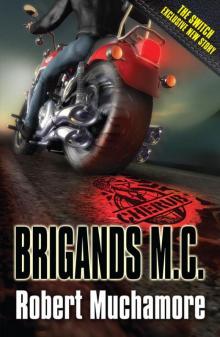 Brigands M.C.
Brigands M.C. Home
Home The General
The General New Guard
New Guard Lone Wolf
Lone Wolf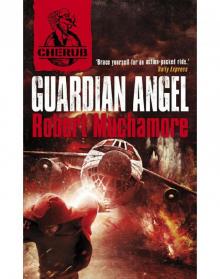 Cherub: Guardian Angel: Book 14
Cherub: Guardian Angel: Book 14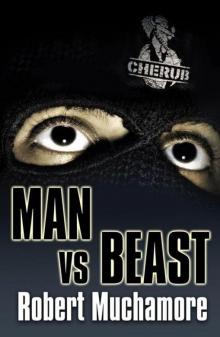 Man vs. Beast
Man vs. Beast The Escape
The Escape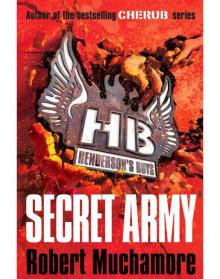 Secret Army
Secret Army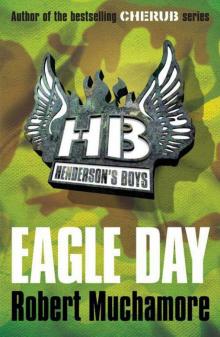 Henderson's Boys: Eagle Day: Book 2
Henderson's Boys: Eagle Day: Book 2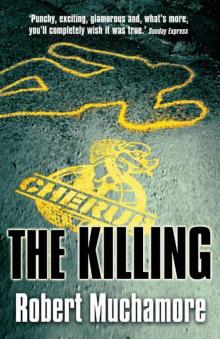 The Killing
The Killing Divine Madness
Divine Madness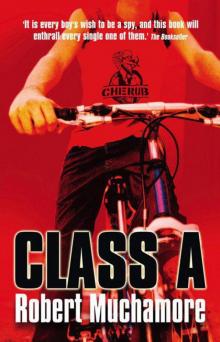 Class A
Class A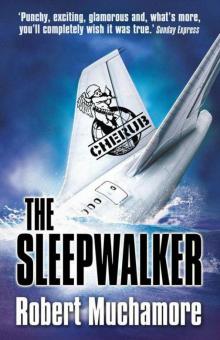 The Sleepwalker
The Sleepwalker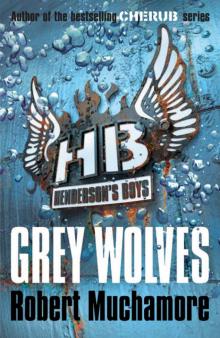 Henderson's Boys: Grey Wolves
Henderson's Boys: Grey Wolves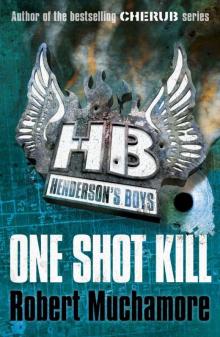 Henderson's Boys: One Shot Kill: One Shot Kill
Henderson's Boys: One Shot Kill: One Shot Kill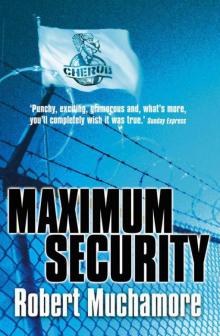 Maximum Security
Maximum Security The Prisoner
The Prisoner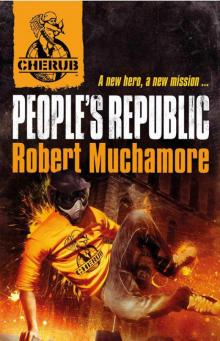 People's Republic
People's Republic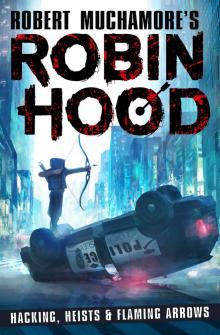 Robin Hood: Hacking, Heists and Flaming Arrows
Robin Hood: Hacking, Heists and Flaming Arrows Shadow Wave
Shadow Wave Mad Dogs
Mad Dogs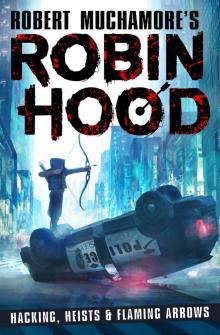 Robin Hood
Robin Hood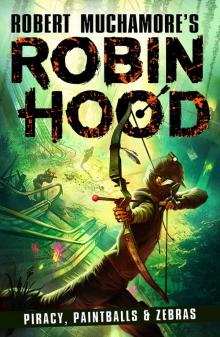 Robin Hood 2
Robin Hood 2 KILLER T
KILLER T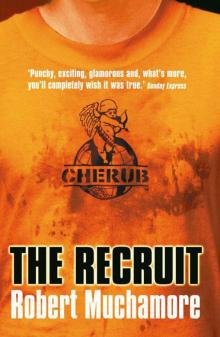 The Recruit
The Recruit Henderson's Boys: Scorched Earth
Henderson's Boys: Scorched Earth The Fall
The Fall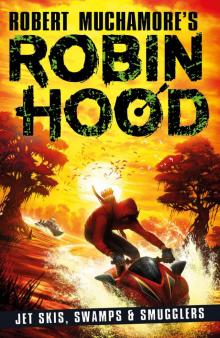 Jet Skis, Swamps & Smugglers
Jet Skis, Swamps & Smugglers Black Friday
Black Friday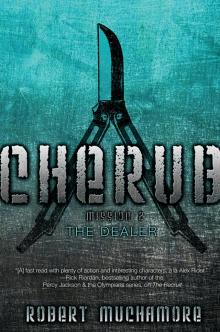 The Dealer
The Dealer CHERUB: Mad Dogs
CHERUB: Mad Dogs Scorched Earth
Scorched Earth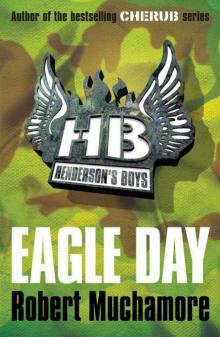 Henderson's Boys: Eagle Day
Henderson's Boys: Eagle Day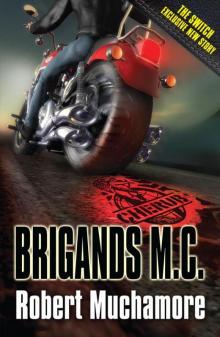 CHERUB: Brigands M.C.
CHERUB: Brigands M.C.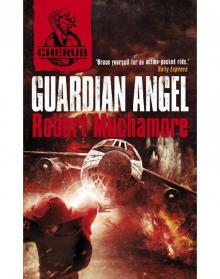 CHERUB: Guardian Angel
CHERUB: Guardian Angel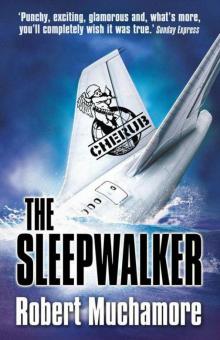 CHERUB: The Sleepwalker
CHERUB: The Sleepwalker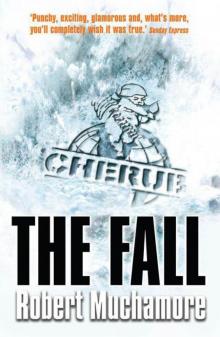 CHERUB: The Fall
CHERUB: The Fall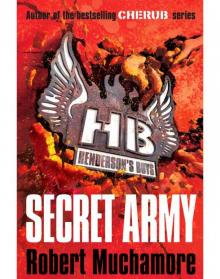 Henderson's Boys: Secret Army
Henderson's Boys: Secret Army CHERUB: Dark Sun
CHERUB: Dark Sun CHERUB: Divine Madness
CHERUB: Divine Madness CHERUB: The General
CHERUB: The General New Guard (CHERUB)
New Guard (CHERUB) CHERUB: Shadow Wave
CHERUB: Shadow Wave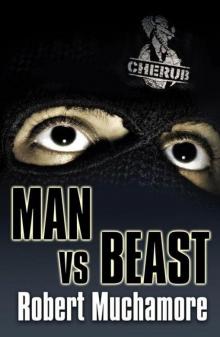 CHERUB: Man vs Beast
CHERUB: Man vs Beast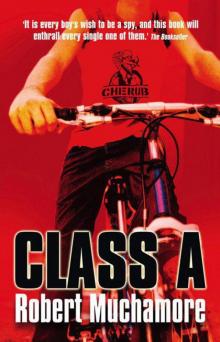 CHERUB: Class A
CHERUB: Class A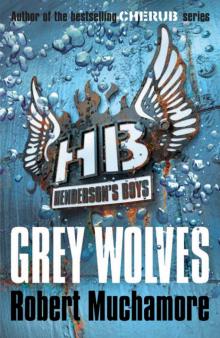 Henderson’s Boys 4: Grey Wolves
Henderson’s Boys 4: Grey Wolves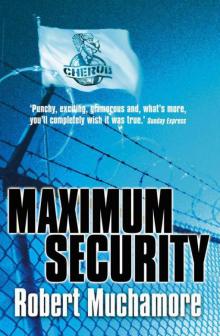 CHERUB: Maximum Security
CHERUB: Maximum Security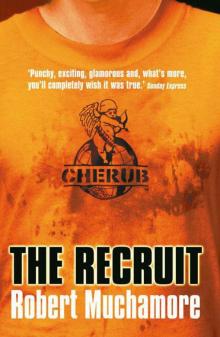 CHERUB: The Recruit
CHERUB: The Recruit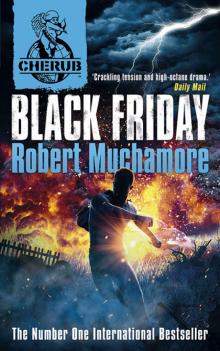 CHERUB: Black Friday
CHERUB: Black Friday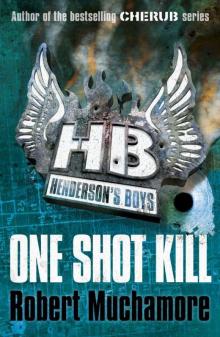 One Shot Kill
One Shot Kill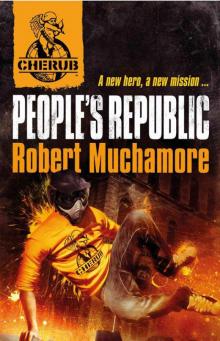 CHERUB: People's Republic
CHERUB: People's Republic